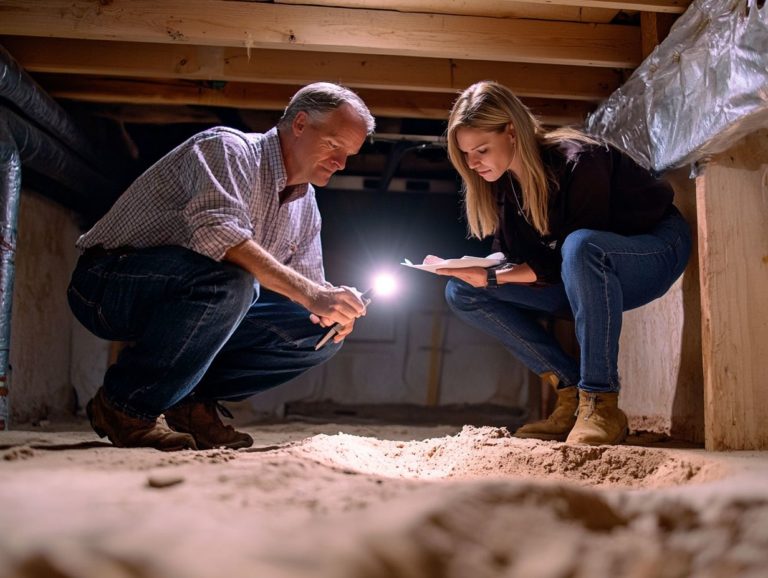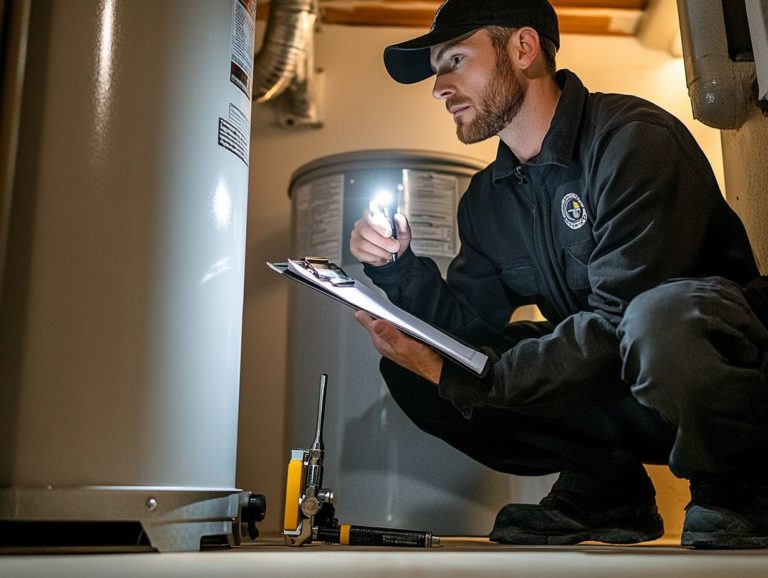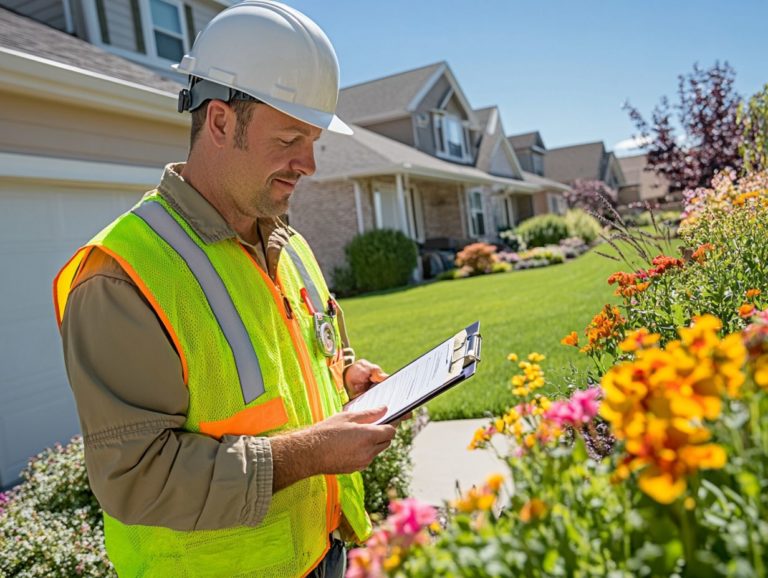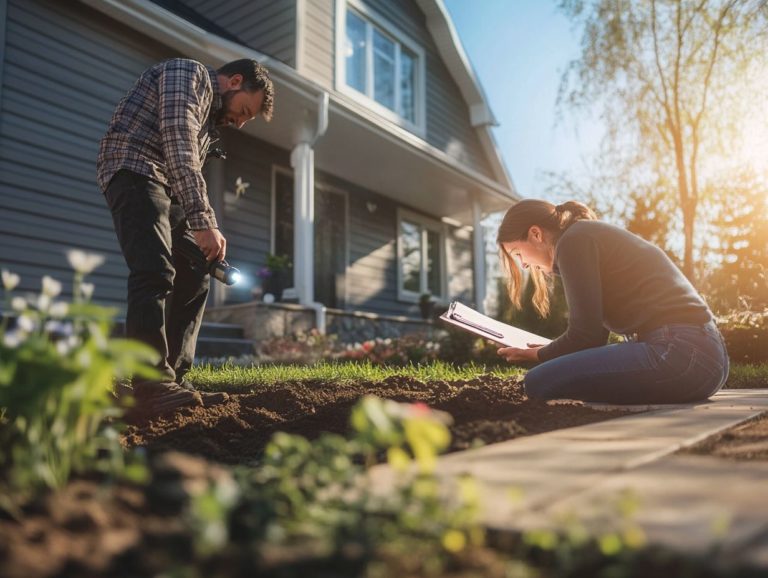Understanding the Home Inspection Process for Buyers
Buying a home is undoubtedly one of the most significant investments you’ll ever make. Ensuring that your new property is in good condition is absolutely essential.
A home inspection plays a pivotal role in this journey. This article delves into what a home inspection involves, why it’s vital for buyers, and the step-by-step process you can expect.
You ll learn what to anticipate in an inspection report, discover common issues that may arise, and understand how to navigate the next steps after the inspection.
Whether you re a first-time buyer or seeking to refresh your knowledge, this guide will empower you to make informed decisions throughout your home-buying experience.
Contents
- Key Takeaways:
- What is a Home Inspection?
- Why is a Home Inspection Important for Buyers?
- The Home Inspection Process
- What is Included in a Home Inspection Report?
- Common Issues Found During Home Inspections
- What to Do After a Home Inspection
- Frequently Asked Questions
- What is a home inspection and why is it important for buyers?
- Who is responsible for scheduling and paying for the home inspection?
- What areas of the home are typically included in a home inspection?
- Can a buyer attend the home inspection?
- What happens if the home inspection reveals issues with the property?
- Can a home inspection be waived?
Key Takeaways:
- A home inspection is a thorough evaluation of a property’s condition, including structural, mechanical, and safety aspects.
- Buyers should prioritize a home inspection to identify potential issues and negotiate repairs before finalizing a purchase.
- The home inspection process involves a step-by-step evaluation, and the report includes key components and information about any potential issues or red flags found during the inspection.

What is a Home Inspection?
A home inspection is an in-depth evaluation of a property’s condition, done by a trained inspector. This essential step, outlined in the understanding the home inspection timeline, allows you to assess important systems like plumbing and electrical before committing to a home purchase, ensuring you are fully informed about the integrity and safety of your potential investment.
The goal of this process is to uncover any existing issues, including significant defects that could impact the property’s value and safety. Understanding the need for home inspections is crucial, as ultimately, you will receive a comprehensive inspection report detailing all findings, enabling you to make a well-informed decision.
Definition and Purpose
A home inspection is all about thoroughly assessing a property’s condition, pinpointing potential risks, and ensuring you, as a homebuyer, fully grasp the understanding the process of home inspections regarding essential systems.
This crucial process allows you to anticipate any repairs that may be necessary while highlighting what sellers are required to disclose.
By uncovering hidden issues early on, a home inspection can sway negotiations, potentially affecting the final sale price and overall closing costs. Without such an evaluation, you might find yourself grappling with unexpected expenses post-purchase, making it essential to navigate the real estate market with a clear understanding of any underlying issues that could impact your investment in the long run.
Why is a Home Inspection Important for Buyers?
A home inspection is vital for every buyer! It provides invaluable insights into the property’s condition and is especially important for sellers to understand the process. For more information, check out understanding the home inspection process for sellers.
This process enables you to make well-informed decisions and steer clear of potential pitfalls during your home purchase journey.
By pinpointing necessary repairs and flaws through a comprehensive inspection report, you can negotiate more favorable terms, ensuring that your investment fits seamlessly within your budget and expectations.
Benefits of a Thorough Inspection
A thorough home inspection offers a wealth of benefits, chief among them the identification of major defects that can significantly impact both a home’s appraisal value and the safety of its occupants.
By uncovering issues that might otherwise remain hidden like concealed mold or structural damage you gain the leverage to renegotiate the purchase price, ensuring you don’t overpay for a property that may require extensive repairs.
This detailed report gives you confidence in your purchase regarding crucial systems like HVAC and plumbing, which often dictate future maintenance costs.
Ultimately, with the right information at your fingertips, you can make informed decisions and even explore options like securing a home warranty to safeguard your investment against unforeseen repairs.
The Home Inspection Process

The home inspection process unfolds as a meticulous journey, beginning with your choice of a qualified home inspector, which is crucial for understanding the importance of home inspections.
From there, you ll engage in a thorough review, utilizing an inspection checklist designed to ensure that every crucial aspect of the property is meticulously assessed for potential issues.
This careful approach ensures nothing gets missed, giving you the confidence you need in your investment.
Don t skip your home inspection schedule one today to protect your investments!
Step-by-Step Guide
The home inspection process starts with choosing a reputable home inspector. Then, schedule the inspection and understand the home inspection process by reviewing the checklist to evaluate various home systems.
To ensure a seamless inspection process, it s crucial to prepare your property in advance. This might mean clearing access points to plumbing fixtures, HVAC units, and any areas of concern, such as attics or basements.
During the inspection, brace yourself for a careful inspection that covers not just the structural integrity but also critical systems like electrical wiring, insulation, and potential plumbing issues, including leaks or outdated piping.
The inspector will provide a detailed report that outlines any deficiencies discovered, along with recommendations for common home repairs and routine maintenance. This helpful information helps you make informed decisions about your investment.
What is Included in a Home Inspection Report?
A home inspection report is an invaluable document that encompasses several key elements, including a thorough overview of the property, detailed findings on its systems, and a list of necessary repairs.
This report serves as a crucial guide for you as a homebuyer, helping to navigate the purchasing process with confidence and clarity.
Key Components and Information
Key components of a home inspection report encompass thorough evaluations of the roof, foundation, HVAC system, plumbing issues, and any major defects that could significantly affect the property’s value and safety for you, the homebuyer.
These elements play a pivotal role in your decision-making process, determining whether you will proceed with a property or seek to renegotiate terms based on potential repairs. For example, a compromised roof doesn’t just detract from the home’s visual appeal; it can lead to expensive leaks that influence both the overall condition of the property and the seller disclosure requirements.
By grasping the implications of these assessments, you can pinpoint potential closing costs that may arise from necessary repairs or replacements. This underscores the importance of a meticulous evaluation during negotiations, ensuring you are fully informed before making a significant investment.
Common Issues Found During Home Inspections
During home inspections, you may encounter common issues that serve as warning signs, such as:
- Outdated HVAC systems
- Plumbing problems
- Structural defects
These concerns can significantly impact your decision-making process as a prospective homebuyer aiming to make a sound investment.
Potential Problems and Red Flags

Potential problems and red flags that emerge during a home inspection can vary significantly, ranging from minor annoyances to major defects that could lead to hefty repair bills. These findings serve as crucial indicators of the property’s overall condition.
Stay alert for signs that might indicate deeper issues. For instance, the presence of mold isn’t just an aesthetic nuisance; it can threaten your health and lead to significant costs for remediation and damage repair.
Lead paint, often lurking in homes built before the 1970s, poses serious health risks, particularly for children, and might require expensive abatement work. Additionally, any signs of compromised structural integrity like cracks in the foundation or sagging ceilings could indicate the need for extensive and costly repairs.
By identifying these red flags early on, you can sidestep unforeseen maintenance challenges and potential financial burdens, enabling you to make informed decisions about your investment.
What to Do After a Home Inspection
Once you receive the inspection report, act quickly! Review it carefully, identify repairs, and negotiate with the seller to resolve any issues before finalizing your purchase.
Negotiating Repairs and Next Steps
Negotiating repairs after a home inspection is crucial for homebuyers. It helps address concerns and can lower closing costs if the seller handles necessary repairs.
Present the inspection findings clearly. Be ready to discuss major defects like structural issues or outdated electrical systems.
Request reasonable concessions, such as price adjustments or repairs. Keep your expectations realistic regarding the seller’s willingness.
Understanding common home deficiencies allows you to speak up for your needs. This can lead to a smoother transaction process.
Frequently Asked Questions
What is a home inspection and why is it important for buyers?
A home inspection is a thorough examination of a property’s condition, typically performed by a professional inspector. Buyers must understand the home inspection process because it helps identify potential issues or defects with the property before making a purchase, allowing them to make informed decisions.
Who is responsible for scheduling and paying for the home inspection?

As a buyer, you will need to take charge of scheduling your home inspection. This optional expense is highly recommended, as it can provide valuable information about the property’s condition, including insights from understanding the home inspection report.
What areas of the home are typically included in a home inspection?
A home inspection usually includes the exterior and interior of the property, such as the roof, foundation, plumbing, electrical systems, HVAC, and major appliances. Some inspectors may also include additional areas such as the attic, crawl space, and pool/spa.
Can a buyer attend the home inspection?
Yes, buyers are encouraged to attend the home inspection. This allows them to ask questions, address concerns, and gain a better understanding of the property’s condition, as outlined in the home inspection process guide.
What happens if the home inspection reveals issues with the property?
If the home inspection reveals issues with the property, the buyer can negotiate with the seller to have them repaired, receive a credit, or adjust the purchase price. They may also choose to back out of the purchase agreement if the issues are significant enough.
Can a home inspection be waived?
Technically, a home inspection can be waived by the buyer. Don t skip this vital step; it could save you from costly hidden issues. Always get a professional inspection before making a major investment like a home purchase.






